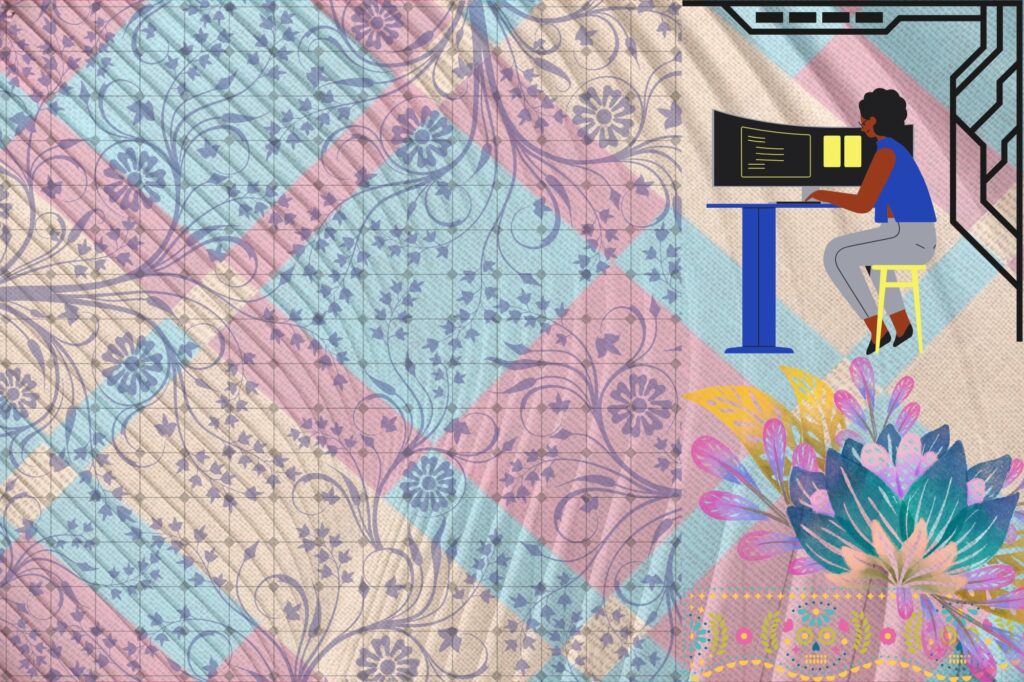A career in Textile Engineering/Textile Technology requires a thorough understanding of the textile industry, the processes involved in producing textiles, and the various technologies used. This article will provide an overview of what you need to know to begin a successful career in this field.
All about Textile Engineering
Textile engineering or textile technology is the study of fabric and the various components that make up the fabric. It is a complex field of study that involves the use of chemistry, engineering principles, and materials science to create and manufacture textiles that meet the needs of society. Textile engineering focuses on designing, manufacturing, and testing all types of fabrics. This includes natural fibers such as cotton, wool, and silk and synthetic fibers such as polyester, nylon, and spandex. It also covers the production and processing of yarns, threads, and fabrics and the design of garments and other textile products.
Textile engineers must possess a deep understanding of the scientific principles behind the design and manufacture of textiles and the practical applications of those principles. They must be able to use computer-aided design (CAD) software to create and refine designs, as well as understand the various production processes involved in manufacturing textiles. They must also be able to troubleshoot and solve problems that arise during the production process. Finally, textile engineers must be able to work closely with customers, suppliers, and other stakeholders to ensure the timely and cost-effective production of high-quality textiles that meet customer requirements.
Types of Programmes in Textile Engineering in India
Textile engineering or textile technology is the study and application of weaving, dyeing, finishing, and other related processes used in producing fabrics, apparel, and other textiles. With the ever-increasing demand for textiles in the global market, textile engineering is a lucrative field in India. In India, various programs are available in the field of textile engineering. The most popular are the Bachelor of Technology (B.Tech) and Master of Technology (M.Tech) degree programs. Both programs equip students with the knowledge and skills required to excel in the textile engineering industry.
In addition to the degree programs, diploma and certificate programs are available in the field of textile engineering. These programs typically cover fabric construction, apparel design, and textile manufacturing processes. Thus, various programs are available in the textile engineering field in India. The degree programs provide a comprehensive knowledge of the field, while the diploma and certificate programs provide an introduction.
1. B.Tech Textile Engineering/Textile Technology
The B.Tech program covers fabric engineering, dyeing and printing of fabrics, apparel design, and textile marketing. A B.Tech degree in Textile Engineering/Textile Technology will teach you the industry fundamentals. You will learn about the processes of creating and manufacturing textiles, such as spinning, weaving, dyeing, and finishing. You will also learn about the materials used in the process, such as fibers, yarns, and fabrics.
Additionally, you will gain an understanding of the safety and environmental considerations necessitated by the industry. In addition to the curriculum, you will develop practical skills such as problem-solving and critical thinking. These skills are essential for a successful career in the field. You will also learn about the machinery and equipment used in the textile industry. The textile industry is an ever-evolving field. As such, you must stay up to date with the latest trends and developments. By taking courses in business, marketing, and finance, you can better understand the industry and stay ahead of the competition.
2. M.Tech in Textile Engineering/Technology
The M.Tech program focuses on advanced topics such as advanced weaving, yarn engineering, and textile chemistry. When pursuing an M.Tech in Textile Engineering/Technology, you will gain specialized knowledge in textile manufacturing techniques, product design, sustainability, materials science, and other important topics. You will also gain expertise in management and marketing, which are important for a successful career in the textile industry.
It is important to note that an M.Tech in Textile Engineering/Technology is very demanding, and only some can complete it. The program requires a strong academic background and a keen interest in the field. You must also have excellent problem-solving skills and the ability to think critically and analytically. You should also have excellent communication and interpersonal skills and a strong dedication to the field. Once you have successfully completed an M.Tech in Textile Engineering/Technology, you will have the qualifications to pursue a successful career in the textile industry. You will be able to pursue various positions, such as design, production, management, and marketing.
Leading institutes for Textile Engineering/Textile Technology
National Institute of Fashion Technology
The National Institute of Fashion Technology (NIFT)offers courses in textile technology. These courses are designed to give students a comprehensive understanding of the textile industry. Students will learn about the various types of fabrics, their properties, and how they are manufactured.
1. Northern India Textile Research Association (NITRA)
The Northern India Textile Research Association (NITRA) offers a variety of courses for those interested in the textile industry. These courses cover various topics, from textile production to marketing and sales. The association has a team of experienced instructors who provide hands-on training to students.
2. Banasthali Vidyapith
Banasthali Vidyapith offers a comprehensive course in textile design. The course is designed to provide students with a strong foundation in textile design. It covers various aspects of textile design, such as weaving, printing, dyeing, and embroidery.
Specializations in the Field of Textile Engineering/Technology
Textile engineering/technology is a broad field covering various specializations. The most common specializations within the field include apparel engineering, textile manufacturing and processing, fiber production and design, and textile product development.
- Apparel engineering involves designing, producing, and selling apparel products, such as clothing, footwear, and accessories. It requires knowledge of materials, production processes, and technologies related to producing apparel products.
- Textile manufacturing and processing involve the production of textiles from raw materials. This includes spinning, weaving, dyeing, and finishing. This specialization requires knowledge of the various types of fibers, yarns, and fabrics and the processes and technologies used in their production.
- Fiber production and design involve the production of fibers, yarns, and fabrics. This requires knowledge of the various types of fibers, yarns, and fabrics and the processes and technologies used in their production.
- Textile product development involves the development of new products and technologies for the textile industry. This requires knowledge of materials, production processes, and technologies related to the production of textiles.
What You Need to Know for a Career in Textile Engineering/Textile Technology
To begin a successful career in Textile Engineering/Textile Technology, you must first understand the industry. You should understand-
- The different types of textiles, their properties, and how they are manufactured.
- Machines and processes used in producing textile products.
- Knowledge of the different types of fabrics and fibers used in the industry. This includes understanding the different fibers and yarns used in producing fabrics and the different dyes and finishes used on textiles.
- Multiple types of machinery are used in the industry. This includes knowledge of the machines used in weaving, knitting, and finishing textiles. You should also be familiar with the machinery used to produce garments and other textile products.
- Various regulations and standards apply to this industry. You should be familiar with the different laws and regulations related to the production and sale of textiles, as well as the safety and environmental regulations that apply to the production of textiles.
Job Opportunities in the field of textile engineering
As a textile engineer, you can work in various industries, including fashion, automotive, and medical. Textile engineers can find a variety of job opportunities in the textile industry. They can work in producing synthetic and natural fabrics, design and create new fabrics, and collaborate with other professionals in the industry to develop cutting-edge materials. They can also work in research and development, using their technical knowledge and creative skills to develop new products and processes. Textile engineers can be employed in jobs such as textile technologists, dyeing and finishing technologists, textile design technologists, quality assurance technicians, and production managers. Depending on the company’s size, textile engineers may also be responsible for the research, development, and testing of new products.
In addition, textile engineers can also find job opportunities in the fashion industry. As a fashion designer, you can use your knowledge of fabrics and materials to create unique and stylish clothing pieces. You can also work in retail, helping customers choose fabrics and garments that suit their needs. They can also work in the automotive industry, designing and creating fabrics for car seats, airbags, and other components.
Core Subjects of Textile Engineering/Textile Technology
Prospective students should be well-versed in the fundamentals of the field, including the following topics:
1. Fibers:
Students should understand the physical and chemical characteristics of fibers and their production and processing.
2. Yarns:
Students should understand the spinning and plying of yarns and the various types of yarns used in the industry.
3. Fabrics:
Students should understand the various types of fabrics and their properties, as well as the fundamentals of weaving, knitting, and finishing.
4. Chemistry:
Students should understand the chemistry of fibers, yarns, and fabrics, as well as the principles of dyeing, printing, and other related processes.
5. Design:
Students should understand the fundamentals of textile design and the principles of product development and innovation.
6. Technology:
Students should understand the fundamentals of textile technology and the principles of automation and computer-aided design.
In addition to these core topics, students should know about the latest advancements in the field and the industry trends shaping the future of textile engineering/textile technology. A well-rounded education in this field can provide the skills and knowledge needed to pursue a successful career.
Skills Required for Textile Engineering/Textile Technology
Textile engineering/textile technology involves various activities, such as designing, manufacturing, and marketing textile products. As a textile engineer/technology professional, you will be required to have the following skills and knowledge:
- Understanding of textile production processes and materials
- Solid knowledge of fiber and fabric properties
- Knowledge of yarn and fabric construction
- Ability to use CAD software to develop textile designs
- Understanding of the latest technology and techniques
- Ability to think creatively and develop innovative solutions
- Strong analytical and problem-solving skills
- Excellent communication and interpersonal skills
- Ability to work in a team environment
- Knowledge of quality management systems
- Knowledge of safety regulations
To be successful in this field, one should have an understanding of textile production processes and materials, knowledge of the latest technology and techniques, and the ability to think creatively.



